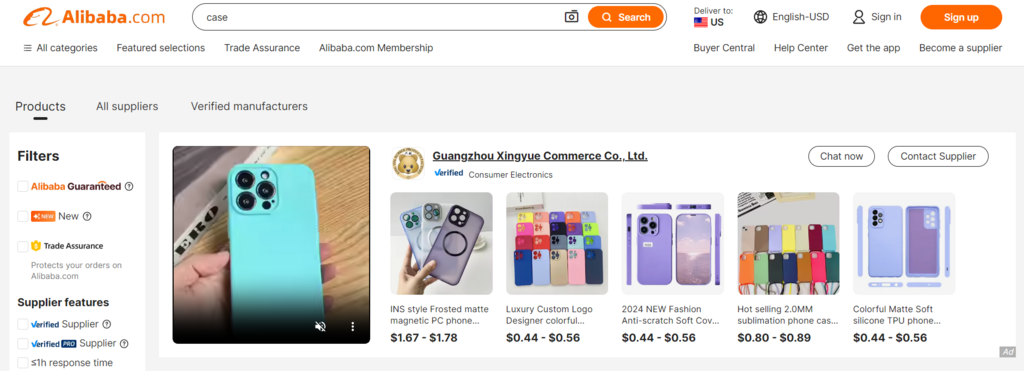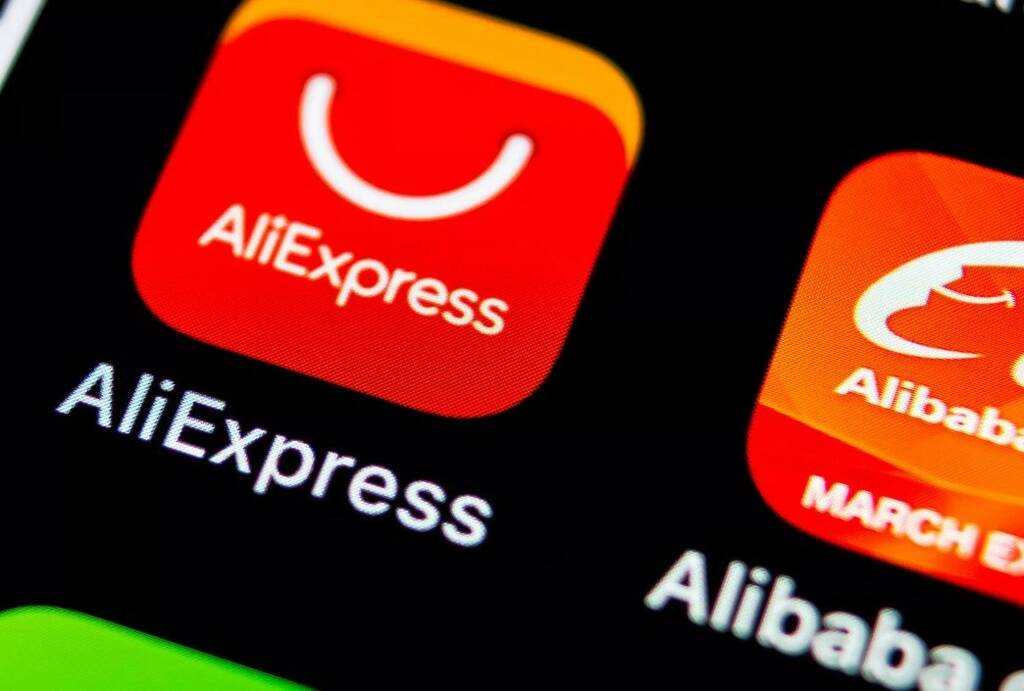What is the difference between Aliexpress and Alibaba
Aliexpress and Alibaba are sites that are similar to each other in terms of assortment and interface. There is even an opinion that they are competing sites. However, both online stores belong to the Chinese company Alibaba Group, which was founded by Jack Ma. Along with Taobao, Tmall, etc. Among others, there is one major difference between Alibaba and Aliexpress. The former is focused on wholesale of goods, while the latter is focused on retail. In this article, we will reveal other aspects of how Alibaba and Aliexpress differ from each other.
Alibaba: main focus on B2B

Alibaba is primarily a B2B (business-to-business) marketplace focused on wholesale trade. Here, companies and entrepreneurs can purchase lots of goods directly from manufacturers and suppliers, often at special prices and conditions. Alibaba allows for large-scale purchases and is ideal for businesses engaged in reselling goods.
AliExpress: main focus on B2C

AliExpress, on the other hand, is focused on retail customers (B2C, business-to-consumer). This platform allows individual buyers to purchase goods in smaller quantities, most often in single items. The platform is suitable for personal use as well as for small entrepreneurs who do not need large quantities of goods.
The main differences between the trading platforms for buyers
Payment and delivery methods – platform difference
A variety of payment methods are available on Alibaba, including bank transfers and third-party payment services. Shipping large shipments requires more complex logistics and often transportation arrangements.
AliExpress uses payment methods more familiar to the retail buyer, such as credit cards, PayPal, and others. The shipping process on this platform is usually simpler and many standard options are offered.

The difference in the ordering and payment process on Alibaba is often inconvenient for online transactions. Some sellers don’t have a “Start order” button, which complicates the purchase process. In most cases, buyers have to contact the seller directly to discuss payment and shipping details. On the platform, customers only see products in the catalog, and a personal communication with the store is required to get detailed information about the price and terms of purchase. In contrast, AliExpress functions as a regular online store, where the entire buying process is organized through the site’s user interface.
Assortment of goods – platform difference
On Alibaba, you will find products from different parts of the world. At the same time, AliExpress is more focused on selling products from manufacturers in China. Both online marketplaces offer a wide range of products, from small items (such as key chains, notepads, tassels) to large-scale machinery, car parts and manufacturing equipment. While the range may be similar in some cases, the difference in suppliers and prices will not always be identical.
Volume of trade (wholesale, retail) – platform difference
On Alibaba, sellers often set a minimum order quantity (MOQ), making the platform preferable for wholesale purchases. This is a key difference in catering to wholesale buyers.
On AliExpress, buyers can even order a single item, making the platform ideal for retail purchases. It is also possible to purchase a single item on Alibaba, but the price will usually be higher compared to a bulk purchase. And there will be an impressive shipping cost to add to that.
Bargaining power – platform difference
The difference in bargaining power is notable. When dealing with suppliers on Alibaba, the haggling process can be quite intricate and involves several components. Not only are you negotiating the prices of the goods, but you’re also discussing shipping terms and production details. This could include minimum order quantities, delivery schedules, and customization options. Effective negotiation on Alibaba requires good communication skills and a clear understanding of what you want from the supplier. Building a good relationship with the supplier can also play a significant role in securing better deals and ensuring a smoother transaction process.
In contrast, shopping on AliExpress is much more straightforward. The prices listed on the platform are usually fixed, meaning there’s little room for negotiation. The difference here is that the buying process on AliExpress mirrors that of traditional online retail stores like Amazon. You select the items you want, add them to your cart, and proceed to checkout. The platform handles all aspects of the transaction, including payment processing and shipping logistics, making it a hassle-free experience for consumers. This simplicity and ease of use are some of the key reasons why many people prefer shopping on AliExpress over more negotiation-intensive platforms like Alibaba.
Shipping and logistics – platform difference
Another difference is in shipping and logistics. On Alibaba, shipping large shipments requires more complicated logistics and often special shipping arrangements.
On AliExpress, shipping is usually simpler and many standard options are offered. The platform also has warehouses operating in the country of residence of the customer. In this case, the parcel reaches the addressee very quickly. Unfortunately, in 2025 there are no such warehouses in our country.
Buyer protection – platform difference
One of the key differences is the system of buyer protection on AliExpress. Its essence is that the seller does not receive payment for the goods until the buyer confirms its delivery and compliance with the order. In contrast, Alibaba does not offer this kind of protection. Returns of goods on this platform can be difficult.
Other difference between Aliexpress and Alibaba
Alibaba offers a more personalized approach to customer service, tailored to the needs of the business.
On AliExpress, customer service is standardized and similar to regular online retailers.
Comparative table outlining the key differences between Alibaba and AliExpress for buyers
| Criteria | Alibaba | AliExpress |
| Payment and Delivery Methods | Multiple payment options, including bank transfers and third-party services. Shipping often involves complex logistics and large shipments. | Retail-oriented payment methods like credit cards and PayPal. Simpler shipping with standard options. |
| Ordering and Payment Process | Ordering can be inconvenient; often requires direct communication with the store. No unified checkout process. Buyers must negotiate terms and pricing. | Functions as a typical online store. The entire purchasing process is streamlined and managed through the platform interface. |
| Assortment of Goods | Products from global suppliers, wide range of goods including heavy machinery. | Primarily focuses on Chinese manufacturers, offering a variety of products from small items to consumer goods. |
| Volume of Trade | Wholesale-focused with sellers often setting minimum order quantities (MOQ). | Retail-focused, allows the purchase of single items without minimum order requirements. |
| Bargaining Power | Extensive negotiation is often required for prices, shipping terms, and production details. | Fixed prices, minimal or no negotiation, similar to traditional retail. |
| Shipping and Logistics | Complex logistics for large orders; international shipping arrangements necessary. | Simple shipping process, often with local warehouses for faster delivery (where available). |
| Buyer Protection | Limited buyer protection; returns and refunds can be difficult to process. | Buyer protection ensures stores only receive payment once delivery is confirmed by the buyer. |
| Customer Service | More personalized, business-oriented customer service with direct interaction. | Standardized customer service, similar to that of other online retail platforms. |

Which is better Aliexpress or Alibaba
Since the target audience of these marketplaces is different, the best choice is the one that fits your consumer goals.
How Alibaba and Aliexpress differ for sellers
Model of interaction with buyers
Alibaba requires direct communication between sellers and consumers to discuss order details, including price, shipping terms and minimum order quantity.
Aliexpress provides a standardized shopping interface where shoppers can directly place an order without communicating with the seller.
Commissions
On Alibaba, the difference in the commission structure can be quite variable and depends on several factors. The commission rates may vary based on the sales volume, product category, and the type of subscription model the seller chooses. Alibaba offers different subscription models, such as Basic, Standard, and Premium, each with its own set of features and associated costs. Stores may also need to consider additional fees for enhanced services, such as marketing tools or premium listings. This difference in variability requires sellers to carefully assess their business needs and choose the most cost-effective plan. Understanding these differences and nuances can help sellers optimize their costs and maximize their profits on the platform.
On the other hand, AliExpress generally charges a flat commission on sales. This difference in the flat-rate commission structure simplifies the financial aspect for sellers, making it easier to predict and manage costs. The straightforward nature of AliExpress’s commission system ensures that stores have a clear understanding of their expenses, contributing to a more transparent and predictable business environment. This difference in simplicity is particularly advantageous for smaller sellers or those new to e-commerce, as it reduces the complexity of financial planning and allows them to focus more on growing their business.
Logistics Solutions – difference between Aliexpress and Alibaba
Alibaba emphasizes international bulk shipments, catering primarily to businesses engaging in large-scale trade. Sellers on Alibaba often need to organize their own logistics, which includes arranging for freight forwarding, managing customs procedures, and ensuring compliance with international shipping regulations. This process can be complex, requiring a thorough understanding of logistics management and international trade laws. Sellers may need to work closely with logistics providers and customs brokers to ensure that their shipments are delivered efficiently and without delays. The responsibility of handling these logistics intricacies falls largely on the store, making it crucial for them to have a robust logistics strategy in place.
In contrast, AliExpress offers integrated logistics solutions through linked services such as AliExpress Standard Shipping. This integration simplifies the shipping process for sellers by providing a streamlined and cohesive logistics network. Sellers can easily manage their shipments, track packages, and ensure timely delivery to customers without having to deal with the complexities of international shipping. This service is particularly beneficial for small to medium-sized stores who may not have the resources or expertise to handle intricate logistics operations on their own. By offering a more user-friendly logistics solution, AliExpress enables sellers to focus more on their core business activities and less on shipping logistics.
Marketing and Promotion – difference between Aliexpress and Alibaba
Marketing on Alibaba requires a more active and strategic approach from sellers to attract B2B customers. Sellers need to develop comprehensive marketing strategies, including creating detailed product listings, engaging in direct outreach to potential clients, and utilizing Alibaba’s marketing tools. This might involve investing in search engine optimization (SEO), participating in trade shows, and leveraging social media to build brand awareness. The competitive nature of Alibaba’s marketplace necessitates that sellers put significant effort into distinguishing their products and services to stand out to business buyers who are often looking for long-term partnerships and bulk purchasing options.
AliExpress provides sellers with various tools to promote their products within the platform, making it easier to reach a broader audience. Stores can take advantage of advertising options such as sponsored listings, pay-per-click (PPC) campaigns, and participation in platform-wide promotions and sales events. AliExpress also offers analytical tools to help sellers track the performance of their marketing efforts and adjust strategies accordingly. These built-in promotional tools are designed to be accessible and effective, enabling even small or new sellers to enhance their visibility and attract more customers without needing extensive marketing experience.
Requirements for Sellers – difference between Aliexpress and Alibaba
Operating on Alibaba involves more serious preparation for trading, especially given its focus on B2B transactions and wholesale markets. Sellers need to ensure that they have the necessary documentation and certificates required for wholesale trading, such as business licenses, product certifications, and compliance with international trade standards. This level of preparation is crucial for building trust with buyers and securing large orders. Stores may also need to establish robust quality control processes and supply chain management systems to meet the high expectations of B2B customers who often demand consistency, reliability, and quality assurance in their transactions.
In comparison, AliExpress is more accessible for beginners and small sellers who want to enter the international market. The platform is designed to lower the barriers to entry, making it easier for individuals and small businesses to start selling with minimal initial investment. While there are still requirements for listing products, such as basic documentation and adherence to platform policies, the overall process is more streamlined and less demanding than on Alibaba. This accessibility allows new sellers to test the waters of international e-commerce, gradually scaling their operations as they gain experience and build their customer base.
Comparative table outlining the key differences between Alibaba and AliExpress for sellers
| Criteria | Alibaba | AliExpress |
| Model of Interaction with Buyers | Requires direct communication between buyers and sellers to discuss details like pricing, shipping, and minimum order quantities (MOQ). | Provides a standardized shopping experience where buyers can place orders directly without needing to communicate with sellers. |
| Commissions | Commission structure is variable, depending on sales volume, product category, and subscription model (Basic, Standard, Premium). Additional fees for enhanced services may apply. | Charges a flat-rate commission on sales, simplifying cost management for sellers. |
| Logistics Solutions | Focuses on international bulk shipments, requiring sellers to arrange logistics independently, including freight forwarding and customs management. | Offers integrated logistics through services like AliExpress Standard Shipping, simplifying shipping for small and medium sellers. |
| Marketing and Promotion | Requires a more active marketing strategy, including detailed listings, SEO, trade show participation, and direct outreach to attract B2B buyers. | Provides accessible promotional tools, such as sponsored listings, PPC campaigns, and platform-wide sales events, suitable for smaller sellers. |
| Requirements for Sellers | Requires more preparation for B2B and wholesale transactions, including business licenses, product certifications, and robust quality control processes to meet high standards. | Easier for beginners and small sellers to enter the market with lower barriers and minimal initial investment. Basic documentation and adherence to platform policies are required. |
Conclusion
Alibaba differs from Aliexpress in that they cater to different market segments and offer different services and features to their customers. The choice between these platforms depends on the needs of a particular buyer or seller. If you need to buy one or a few items, it is better to use Aliexpress. This site is simpler and more convenient. In addition, sellers there provide coupons and promo codes, as well as regularly hold promotions and sales. Now you know the difference between Alibaba and Aliexpress.








